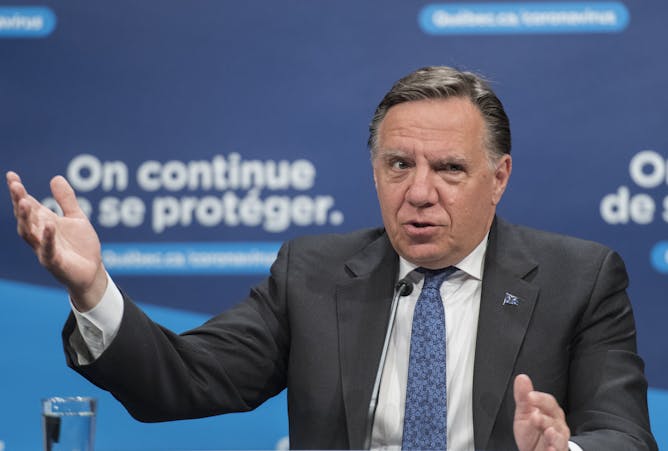|
In 1995, my former and current boss, Scott White, The Conversation Canada‘s CEO, sent me to Montréal for a few weeks to work the referendum desk for The Canadian Press. It was a tense time, the culmination of years of constitutional turmoil between Québec and the rest of the country that came very close to the province seceding from Canada. The assignment — and the night the No side narrowly won — remains one of the most memorable of my journalism career.
Premier François Legault’s recent constitutional proposals have caused alarm in legal and political circles, particularly among those who still clearly remember that night 26 years ago and all the upheaval that lead up to it. Legault, himself a former separatist, has unveiled Bill 96 aimed at protecting the French language in Québec. The bill would change the Constitution Act of 1867 via two clauses asserting that Québec is a nation and that French will be the only official language of the province.
But is there less to Legault’s move than meets the eye?
Today in The Conversation Canada, Andrew McDougall of the University of Toronto argues it’s aimed at finding common ground between federalist and separatist voters in Québec a year ahead of a provincial election. He writes: “If Legault has read Québec voters correctly, he’ll be a political hero. But if — or when — this dies in the courts, there will be no other politician or other level of government to blame. And that keeps a lid on constitutional politics.”
Also today:
All the best,
|
Lee-Anne Goodman
Politics, Business + Economics Editor
|

|
|

Worried about another 1980s-style constitutional crisis? Don’t be. There may be less than meets the eye to Québec Premier François Legault’s recent constitutional proposals.
THE CANADIAN PRESS/Graham Hughes
Andrew McDougall, University of Toronto
Québec Premier François Legault's recent constitutional proposals have caused alarm. But it's largely a game aimed at finding common ground between federalist and separatist voters in the province.
|

Those speaking out for Palestinian human rights continue to be sidelined and silenced in Canadian institutions.
THE CANADIAN PRESS/Justin Tang
Lucy El-Sherif, University of Toronto
Injustices towards the Palestinians' struggle don't stop at the borders of Gaza or the boundaries of East Jerusalem. Across Canada, the atmosphere is menacing for those who speak up for justice.
|

What hapens when someone outside of the university community co-ordinates a mass email campaign demanding the firing of a faculty member? University policies need to cover this.
(Shutterstock)
Jaigris Hodson, Royal Roads University; Chandell Gosse, Royal Roads University; George Veletsianos, Royal Roads University
Where policies do address online abuse and harassment, they're largely ineffective in a world where academics engage with people in a variety of public platforms and through social media.
|

Amnesty International staff and volunteers gather at a climate change protest in Toronto in Sept. 2019.
THE CANADIAN PRESS/Christopher Katsarov
Dominique Clément, University of Alberta
More than most other countries, the non-profit sector in Canada relies on government funding. Yet there is a shocking lack of transparency.
|

Members of BTS at the 61st Grammy Awards in Los Angeles.
(Shutterstock)
Hyounjeong Yoo, Carleton University
A new wave of Korean music and cinema can play a powerful role in changing perceptions and stereotypes of Asian people.
|
La Conversation Canada
|

Il y a de plus en plus de femmes sur les conseils d'administration des grandes entreprises, mais c'est d'être le cas pour les PME. Comment accélérer le changement culturel?
Shutterstock
Louise Champoux-Paillé, Concordia University
Les grandes entreprises ont plus de facilité que les plus petites à atteindre la parité hommes-femmes sur leur conseil d’administration. Et celles qui se dotent de cibles précises font mieux.
|
COVID-19
|
-
Jamie Rowen, University of Massachusetts Amherst
As the coronavirus pandemic played out, veterans who were already lacking adequate benefits and resources found themselves in deeper trouble.
|
|
Arts
|
-
Judy Seidman, University of the Witwatersrand
Four decades later, post-apartheid South Africa barely recalls the Medu Art Ensemble's contributions to the liberation struggle. But that could be changing.
|
|
Politics
|
-
Jonathan Beloff, SOAS, University of London
It will take time for Rwandans, especially those who suffered or witnessed the genocide, to trust France again.
|
|
| |
| |
| |
| |
| |
| |
|
|